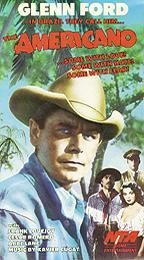
THE AMERICANO
US, 1955, 81 minutes, Colour.
Glenn Ford, Ursula Thiess, Cesar Romero, Abbie Lane, Frank Lovejoy.
Directed by William Castle.
The Americano is an entertaining average western (set it Brazil) from the mid '50s. Glenn Ford was at ease in this kind of role. He was seen to better advantage in many of the westerns by Delmer Daves (Jubal, 3.10 to Yuma, Cowboy). Frank Lovejoy, often the picture of American uprightness, is the villain (reminiscent of Richard Nixon and ironically of his cover-ups and pushes to power in later decades). There is pleasant support from Cesar Romero and a voluptuous Abbe Lane (whose songs were provided by her husband Xavier Cugat). The unprepossessing heroine is Ursula Thiess, Robert Taylor's wife. Direction is by William Castle, later known for his rather violent horror and science fiction films: The Tingler, I Saw What You Did, Project X. The film has colourful locations and is a reminder for later decades of the social problems besetting Latin American countries.
1. An entertaining western? The Latin American setting? Relationships between the United States and Brazil? The tradition western themes: bandits, property owners, ranching, violence? Romance? The relevance of the contemporary setting?
2. Colour photography, the range of location photography: ranches, jungles, the atmosphere of Brazil contrasting with Texas? The musical score? Abbe Lane's songs ? and exotic dancing?
3. Audience acceptance of the conventions: hero. quest. murder, villains, good-hearted bandits. antagonistic heroine? The confrontations? The resolutions? How well did the film use its conventions? A western with a difference? Conventions in the Brazilian setting?
4. The background of the Texas ranches? Prize bulls? Deals with South America? Property owners? Bandits? The flourishing of violence and oppression? The hero caught up in the Brazilian problems? The locals and their fighting for their rights? The single-minded villain in Hermanny? The credibility of the plot?
5. Glenn Ford’s easy style as Sam Dent? His hopes, moving to Brazil, taking care of the bulls? The long trek into the Brazilian countryside? The discovery that Barbossa had been murdered? The accompaniment by Manoel, the jungle and the dangers of the trek e.g. the piranha, the wild cats? The encounter with Marianna and subsequent hostility? Selling the cattle to Hermanny? His discovery of Manoel's actions? His decision to refuse Hermanny's offer, to return to Texas? His being waylaid and attacked? The violence on Marianna's foreman? The discovery of the truth about Hermanny? His not wanting to be involved? The capture? Manoel's friendship? Teresa and her giving information to Manoel? The festive evening and the reconciliation with Marianna? The arrest, the false witness, the threat of the piranha? The build-up to the shootout with Hermanny? The American stance against the obsessive, power-hungry Hermanny with his religious tones? The future for Dent? The American of the typical western?
6. Hermanny as villain: his sympathetic presentation of himself, care for Sam, offering him the job, his attitudes and comments on Manoel? His seeming righteousness? The gradual revelation of the truth, the murder of Barbossa, his greed, oppression of the poor, murder of Marianna's foreman etc.? His confrontations with Sam and his obsessive explanations? The invocation of God? The final confrontation? An offbeat villain?
7. Marianna as heroine, the initial clash, the swimming sequence and tantalising Sam, the antagonism at the evening, reconciliation, her suspicions?
8. Teresa and her role as Hermanny's servant, with Manoel, her dances? Manoel and Cesar Romero's genial humour, accompanying Sam, seeming to be villain, the truth, his rescuing people in the nick of time? The good-humoured Brazilian?
9. The picture of Hermanny's henchmen and their cruelty? The villagers and the oppression, the burnings? The police, the shootings? The threats? The execution of justice?
10. The build-up to the finale and the gunfight? The authentic background of life on the Brazilian ranches, the countryside, the possibilities for cattle? The poor and the oppressed? The wealthy families and their arrogance? Relevant themes for Latin American history? The effectiveness within the context of a western?